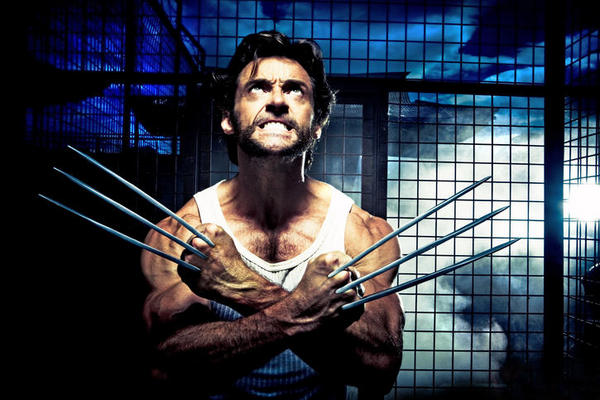101 WAYS TO MAKE A "B" MOVIE - X-MEN ORIGINS: WOLVERINE
There is a scene in Robert Altman’s film The Player where a group of studio executives sit around a conference room discussing moviemaking. Larry Levy (played by Peter Gallagher) suggests that writers be eliminated from the process and they could simply pull stories from the newspapers to make films. Griffin Mill (played by Tim Robbins) responds by saying that “if we could just get rid of these actors and directors, maybe we've got something here.” It is a critique of the Hollywood style of film production. Altman knew that although his film was meant to be read as satire, he really did view the system in such a manner, which ultimately gave his film its weight and pushed it into classic film status. Oddly enough, this film crept into my thoughts many times while watching X-Men Origins: Wolverine. This was probably due to the fact that there seemed to be no writer (or at least one who can plot out a coherent narrative), the direction seemed half-hearted at best, and while the film is full of actors none of them seemed capable of pulling off a cohesive characterization.
I like superhero films. But I am starting to realize that we are being subjected to more and more films that look good on paper (literally) but when translated leave much to be desired. Those few films that do succeed (not just financially but conceptually and demonstratively – financially successful doesn’t mean it succeeded, see The Fantastic Four films) have left the powers that be in Hollywood searching for the next big superhero film without investigating just why those specific films were successful. The first two X-Men films succeeded thanks to the skill of director Brian Singer. He, unfortunately, proved to be somewhat less successful with his Superman film. So it is the combination of the right material, the right cast, and a director who can make it happen. X-Men Origins: Wolverine is following on the heels of the financially successful yet atrocious X-Men: The Last Stand (or X3). It seems to have fallen victim to the same things that brought that film down.
The film starts off interestingly enough. We see Logan, AKA Wolverine (played when an adult by Hugh Jackman), as a sickly teenager in mid-nineteenth century Canada. We are introduced to his brother Victor (Liev Schreiber) who will become Wolverine’s arch-nemesis Sabertooth sometime down the road. Through the magic of montage we learn that Victor and Logan become soldiers, are seemingly impossible to kill, and apparently fight in every major war from the American Civil to Vietnam. Interestingly them seem only to fight and work for the American Government and military, don’t the Canadians have some sort of Army or secret agency that they could work for? This is only the first of many narrative elements that are confusing. Shortly after this montage the brothers are rotting in a jail cell (Victor plays with a rat in his cell for no apparent reason – is this to show character development? If he is an animal wouldn’t he eat the rat?) when an evil military guy named Stryker recruits them. Now Stryker played a large role in the second X-Men film, X2. The film not only gives us Wolverine’s back-story, but also Stryker’s (the two are linked, shockingly!). Okay. Now keep up because here is where is gets complicated and confusing.
The brothers are now apparently part of a group of super powered men who serve at the beck and call of Stryker. We are introduced to the rest of the “team” and witness one of the most unlikely pairings in cinema history: Liev Schreiber and Ryan Reynolds. Not to say that Reynolds can’t act, I’m just saying that the two of them couldn’t be further apart in terms of acting style and it really, really shows. You get to see that a casting agents wet dream sometimes doesn’t benefit a film. This becomes more and more evident as the film progresses but you can’t miss it here. The same feeling occurs when Jackman has to act against Lynn Collins. She plays Kayla Silverfox, his girlfriend, who is killed but then isn't. Don't ask.
Now it seems that the team is on a mission to steal diamonds. Or are they? Reynolds’s character gets to shine momentarily – by which I mean he gets to fight bad guys - while the others mainly stand around and look concerned? Scared? Evil? I couldn’t tell what they were meant to feel but whatever emotion they were projecting, they really meant it. And here you come upon another moment in the film where I got confused. Logan suddenly realizes that he is working for some bad men and wants out. He fights his brother briefly, hurls his dog tags to the ground and leaves the group. This would have made sense if we had known it was coming. Maybe I missed Logan’s emotional turn somehow. Maybe there was a scene when I momentarily looked away from the screen that foreshadowed Logan’s sudden conscience. Maybe, but I doubt it. And if I thought that was poorly telegraphed there was more to come.
I could go through this film scene by scene telling you when and where things go wrong but that would be tedious for all involved. Let me try and tackle just what was going wrong over all. There were three main things that caused this film to veer wildly off course. First was the script. Second was the acting of said script and third there was the direction. Written by Daniel Beniof (Kite Runner andTroy) and Skip Woods (Hitman and Swordfish) the script was an exercise in by-the-numbers scriptwriting (as long as you skip a couple numbers here and there). There are moments that are truly laugh out loud funny (not intentionally - see above mentioned scene with Reynolds and Schreiber). Then there are scenes seemingly out of a Douglas Sirk film. This juxtaposition of action/bravado with romance/high drama is very difficult to do well. Most directors don't even try. They try and they fail.
The writing is just plain bad. It relies on cliché and has virtually no character development or flow. The film lumbers from act to act (I think – I’m not sure if the transitions were obvious enough for me) with no real sense of who these people are, their motivations and you know, by the end, we really don’t care. I don’t even want to know where the idea to have Wolverine vulnerable to an adamantium bullet (that is the same metal they graft to his bones) came from. I believe this is when I exclaimed out loud “you have got to be kidding me” in the theatre. Another annoyance was the use of the character Gambit. One minute he’s there, the next he isn’t. And then he fights Wolverine but they become friends? Seriously?
A good director can make due with a poorly written, ham-fisted script. Singer did this with his X-Men films and Jon Favreau did rather well with Iron Man. Let's face it, most of these superhero films are like this. However, poor Gavin Hood also seems to have no idea what type of film he is shooting. Which is not only a disaster for us, the audience, just think of the poor actors! Hood comes from an acting background, a fact which leaves me confused since he can’t seem to direct this cast, and has made two other films which were much more about character study: Tsotsi and Rendition. It is as if the actors couldn’t pull off the wooden dialogue and the director couldn’t help them do it. It was frustrating to watch. Hood couldn’t quite bring together what were two very different films.
Ultimately X-Men Origins: Wolverine was disappointing because I wanted it to be good. And it wasn’t. I love the characters and the world that is around them. It is disheartening to see it presented so poorly. I am not one of those people who insist that the film and the source material be one and the same. I honestly liked Watchmen and felt that it worked as a film in a very different way than the graphic novel did. I enjoy a film that succeeds on its own, regardless of how if diverges from its origins. What makes me mad is when filmmakers and screenwriters are given such a rich, deep world to work with and they do a shoddy job of it. Alas, X-Men Origins: Wolverine is going to join that group of films that are financially successful but won’t be classics. It has already grossed $165 million since its release. It will go on to earn more money. But what it won’t have is staying power. In my mind it will be remembered for taking a great character and wrapping a really mediocre film around it.
- Wolverine
Image via Google.





